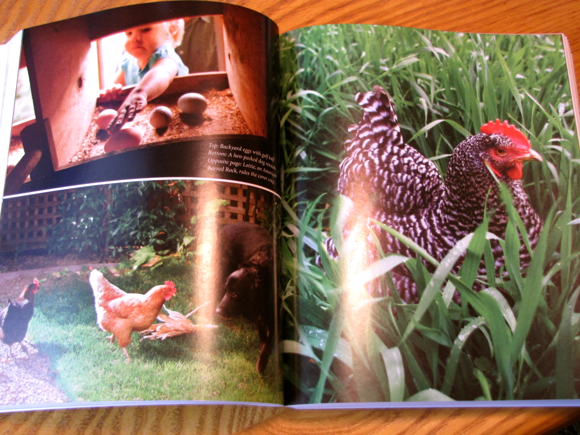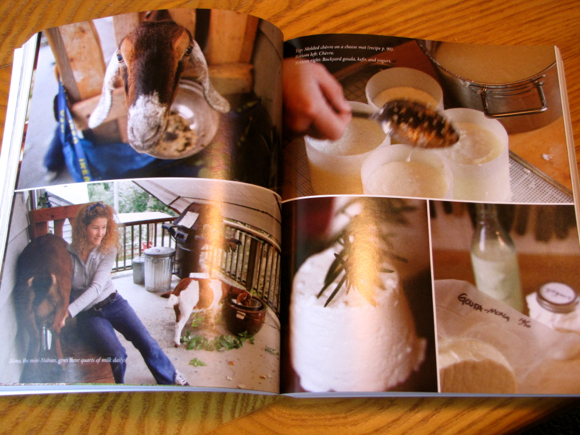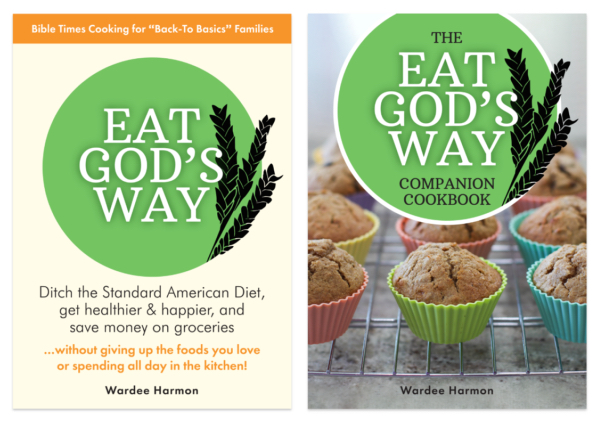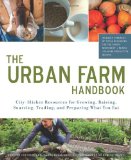Urban farmer Annette Cottrell (from SustainableEats.com) and I have been internet friends for a long time. I forget if she found me or I found her. But that’s not important. What’s important is that we liked each other from the start and found a common kinship in growing, raising, sourcing, and preparing our own foods. Plus, we both live in the Pacific Northwest. So I am really, really thrilled to tell you about her amazing new book.
She, with Joshua McNicholls (a Seattle-based journalist with a long-term interest in sustainability and food security), wrote The Urban Farm Handbook. And what a handbook it is! Here’s what I love.
The photos. Gorgeous inspirations of what can be done in a city to grow, source and prepare your own food.

The book is organized seasonally. The authors start with winter, focusing on grains, eggs/chickens and dairy. This section, like the others, opens with a sidebar “what we are eating now.” You’ll find one of my spelt recipes in this section, as well as all kinds of helpful information raising chickens and backyard dairy animals, like goats. Right from the beginning, this book earns its title as “handbook.”
As you move into spring, you’re getting into the dirt — growing your own produce, composting, CSAs (Community Supported Agriculture) or COA (Community Owned Agriculture), starting and sowing seeds, pests and beneficial insects, and bees.
In summer, the authors say, “living is anything but easy” with the tasks of preserving garden bounty a never-ending project. Never fear, they’ll walk you through this season with many recipes (the book offers nearly 100 throughout), seasonal foraging, trading with neighbors, getting the garden ready for winter, preservation (cellaring, freezing, dehydrating and fermenting), food community kitchens, and bulk buying clubs.
And last but not least, fall rounds out the year by focusing on slaughtering sustainably raised meat. You’ll learn the cuts of beef and pork, with recipes to prepare virtually every part of it. You’ll discuss your options for raising small backyard animals on your own — like rabbits, chickens, ducks, and backyard aquaponics (fish). Fall also includes beverages, syrups and sundries (like soap).
The lists. Annette shares her homestead calendar, and each season gets a page, so you can see what she does when. I don’t know about you — but a simple list like this is invaluable to me because of how it opens up my eyes to the big picture. Seemingly for fun, she also includes her before and after grocery shopping list. What she bought before becoming an urban farmer is a far cry from what she buys now.
The people. Throughout the book, Annette and Joshua share producer profiles — real people who produce food and share the vision for local and sustainable food. From community kitchens to hog farmers to urban dairy goat farmers, you’ll meet and be inspired by their stories.
The favorite techniques. Annette and Joshua, as well as their family and friends, really shine in this book. This personal touch makes the book, already awesome, that much more endearing and memorable. For instance, check out “Annette’s Lazy Compost Pile” technique as well as “Joshua’s Efficient Compost Pile.” Or, each shares their best tomato growing technique — I suggest you try both this summer and let us know which you prefer! 🙂

I could go on and on. I have paged through this book many times since Annette sent me a copy. It brings delight each time. I don’t read it cover to cover. I prefer flipping through the sections and savoring what the pages uncover.
I give The Urban Farm Handbook a big thumbs up! It is the book I now recommend as the go-to book for farming and homesteading — especially urban, but rural, too. The scale is bigger if you’re rural, and probably other factors differ, but I have no doubt that this information crosses county lines.
Currently $19.26 on Amazon (or $11.99 on Kindle), this is a resource that everyone interested in sustainable food production should get, pronto.
Disclosure: Annette, dear friend that she is, sent me a review copy of The Urban Farm Handbook without even asking me for a review. But how could I not? This book is fabulous! Order it today.
...without giving up the foods you love or spending all day in the kitchen!

2 free books:
Eat God's Way
Ditch the Standard American Diet, get healthier & happier, and save money on groceries...
We only recommend products and services we wholeheartedly endorse. This post may contain special links through which we earn a small commission if you make a purchase (though your price is the same).



sounds like something I need to read, we’ll be moving to scottsdale, az, would this be of benefit to me?
Yes! Though the authors’ experience is with PNW, I think it would help anyone, anywhere. 🙂
Love this book! It’s what inspired me to double the garden size this year and invest in a grain mill. 🙂
I will be doing a few rows in my neighbor’s community garden plot this year. I am a complete newbie – is this at a level for someone like me?
Jessie — Definitely! This book is for the total newbie to the experienced. Good tips for all. I’m happy to hear you’ll be working in a community garden. I love that!
Thanks Wardee! If all goes well with a few rows, maybe I’ll get my own plot next year! And this year I hope to can peaches from an orchard I know.
Thank you Wardee!
I just bought a cow share, so I will be picking up fresh raw milk each week. The first item I am making is Kefir. I made it from a package not grains as I haven’t found those in my area yet. I do need some advice as what to use the remainder (3 quarts) of milk for. I stirred the cream into the milk before I removed any for Kefir. Please help!!!
Hi Wardee! It was a pleasant surprise to see one of your recipes in the book!
Can’t wait to get my hands on this book. It looks great!
I am very interested in this book however I live in the southeast. Do you think this would be something that I could benefit from being on the opposite side of the country? Thanks!